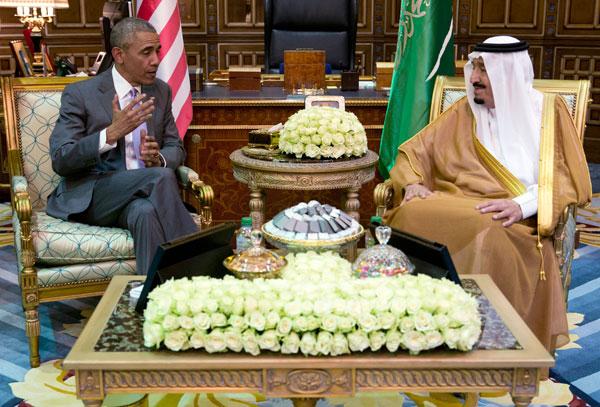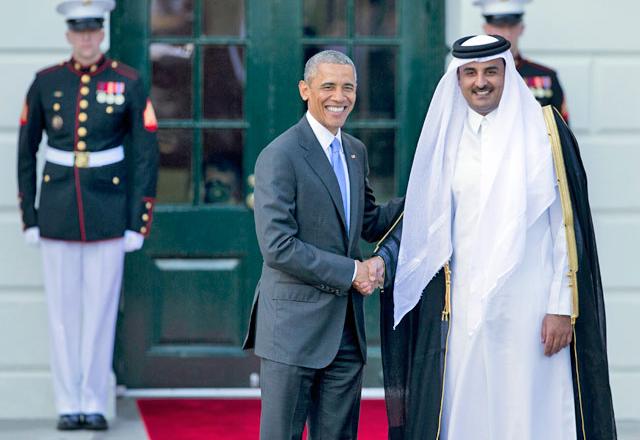You are here
Obama meets Saudi king as US Iran policy strains alliance
By Reuters - Apr 20,2016 - Last updated at Apr 20,2016

US President Barack Obama and Saudi Arabia’s King Salman meet at Erga Palace in Riyadh, Saudi Arabia, on Wednesday (AP photo)
RIYADH — US President Barack Obama met Saudi Arabia's King Salman on Wednesday to seek joint action on security threats including Iran and the Daesh terror group, but his visit is overshadowed by Gulf Arab exasperation with his approach to the region.
The American president has come to the world's top oil exporter for a fourth and likely last time, hoping to reassure King Salman and other Gulf leaders, whom he will meet on Thursday, of Washington's commitment to their security.
Most of the Gulf Arab monarchies have in private been sorely disappointed by Obama's presidency, regarding it as a period in which the United States has pulled back from the region, giving more space to their arch rival Iran to expand its influence.
For his part, Obama has spoken of his desire to persuade Gulf states to arrive at a "cold peace" with Iran that would douse sectarian tensions and allow all sides to focus on what he sees as a greater threat emanating from Daesh.
After a low-key arrival in Riyadh, which unlike some previous visits was not shown live on Saudi television, Obama met King Salman and a group of top princes and officials at the Erga Palace for a two-hour meeting.
Later on Wednesday, Obama was set to meet privately at his hotel with Abu Dhabi's crown prince Sheikh Mohammed bin Zayed Al Nahayan to discuss regional issues and ways to deepen cooperation in the fight against Daesh, the White House said.
US Defence Secretary Ashton Carter, National Security Adviser Susan Rice and Central Intelligence Agency Director John Brennan were among Obama's entourage, demonstrating the focus on security in the president's agenda with his Gulf counterparts.
On Thursday, he will attend a summit of the GCC, a group of monarchies comprising Saudi Arabia, Kuwait, Qatar, Bahrain, the United Arab Emirates and Oman.
Apart from Oman, they are ruled by Sunni Muslim dynasties who see revolutionary, Shiite Iran as a threat to their security and say its involvement in Iraq, Syria, Lebanon and Yemen has fuelled conflict and deepened sectarian divisions.
That tension surfaced again on Wednesday when Iran’s Supreme Leader Ayatollah Ali Khamanei attacked Riyadh’s attempts to isolate its ally, Lebanon’s Hizbollah movement, in a series of fiery Tweets.
“Hizbollah is shining in the Muslim world. It doesn’t matter if a corrupt, dependent and hollow government with the use of petrodollars condemns it in a statement. To hell with it,” he wrote.
The White House shares the view of Gulf Arab states that Tehran plays a destabilising role, but its push for the nuclear deal Iran agreed with world powers last year caused fears in Riyadh that Washington was not listening to their concerns.
Reassurances
There was no immediate word on whether Obama or King Salman had addressed a New York Times report that Saudi Arabia has threatened to sell its multi-billion dollar US assets if Congress passed a bill that could hold the kingdom responsible for any role in al Qaeda’s September 11, 2001 attacks.
Obama said he opposes the bill because it could expose the United States to lawsuits from citizens of other countries.
The attack was mounted by Al Qaeda, then based in Afghanistan. Fifteen of the 19 hijackers were Saudi nationals, although no US investigation to date has reported finding evidence of Saudi government support for the attacks.
Before Obama met King Salman, in an ornate room in a Riyadh palace, US Defence Secretary Ash Carter had talks with his Gulf Arab counterparts on ways of countering Iranian influence and fighting Daesh.
They agreed on joint cooperation towards improving Gulf missile defence, special forces and maritime security, but no new deals were announced.
The GCC secretary general said the bloc and the United States would stage joint maritime patrols to stop weapons smuggling to Iran. American officials said these were already taking place and did not represent a new step.
Obama’s words of reassurance follow a series of top-level meetings between US and Gulf officials in recent years in which Washington aimed to get across the same message.
He and King Salman last met in the United States in September, a meeting that followed a Camp David summit with Gulf leaders in May that several of the monarchs did not attend.
More recently, Obama was quoted in a US magazine interview describing some Gulf and European states as “free riders” who called for US action without doing enough themselves.
In comments that were widely criticised in the Gulf but not directly responded to by top officials, he was also quoted as answering a question about whether Saudi Arabia was America’s friend by saying “it’s complicated”.
Saudi television earlier broadcast Gulf rulers being welcomed on the runway by King Salman and a host of other robed officials, scenes that were widely contrasted by Saudi social media users with the lack of pomp on Obama’s arrival.
Obama is set to meet with the leaders of Britain, France and Italy in Hanover on Monday with Daesh and other security issues high on the agenda.
Related Articles
President Barack Obama sought to reassure Persian Gulf nations on Thursday that the United States is committed to their security, insisting a nuclear deal with Iran would not leave them more vulnerable.
US President Barack Obama on Wednesday went out of his way to praise two of Saudi Arabia's top leaders before meeting privately with them at the White House and played down the absence of King Salman, who pulled out of the visit last week.
Saudi Arabia is satisfied with assurances from US President Barack Obama about the Iran nuclear deal and believes the agreement will contrib













